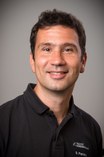Sustainable food security - DECIDE
Data-driven control and prioritisation of non-EU-regulated contagious animal diseases (DECIDE) is a five-year Horizon 2020 project, which will develop data-driven decision support tools that offer robust and early signals of disease emergence in cattle, salmon, poultry and pigs. This partnership garners expertise in veterinary epidemiology and diagnostics, data science, mechanistic and predictive modelling, economics, animal welfare and social sciences. Coordinated by Utrecht University, this multidisciplinary consortium brings together 19 partners from 11 European countries.
To enable the detection of early signals of disease in a population, DECIDE will harvest the currently underused potential that lies in a clever combination of existing and new data and data streams. New data streams are generated by precision livestock farming technologies that have started to transform the livestock sector and are increasingly implemented on farms to improve their health, welfare and production efficiency. However even in those farms that are not yet equipped with such technologies, there usually is production and slaughterhouse data available, the full potential of which is not currently utilised. DECIDE will establish the prevalence and burden of contagious production diseases that lead to clinical signs in the gastro-intestinal or respiratory tract of calves, pigs and poultry and of specific pathogens related to growth reduction and mortality in salmonids.
Objectives
The main scientific objectives of DECIDE are:
- Implement data access methods at each data provider, based on species-specific ontologies
- Build multi-variate and multi-level dynamic monitoring models for early detection of diseases
- Build warning systems, which utilise both the monitoring and simulation models
- Determine the multidimensional burden of disease metric of contagious production diseases
Role of Ghent University
UGent is leading Work Package 1 which deals with ‘Data identification, characterisation and acquisition’, in which we provide key contributions by developing species-specific ontologies for data integration, and test of alternative approaches for data access. In addition, UGent provides a supporting role in the communication and dissemination activities in various other work packages.
UGent is also leading the pilot cases for cattle, horizontally integrating the different work packages for this species.



